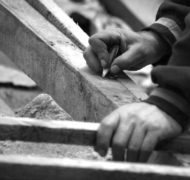The Work of a Roofer
Blog / Produced by The High Calling
Roofing was, they joked, "second from the bottom on the job list … one up from shark bait." I didn’t know this at my interview after high school, but I learned it quickly. Roofing is unusually hard work. Consider the cold tar tear-off.
Tear-offs took place at night. The boss would tell us to show up with enough clothing to cover our entire bodies. No skin could be exposed to the tar dust or else the sun would melt it into your pores, sending you to the ER with your skin on fire and eyes swelled shut. When the morning crew rolled in, they'd yell at us to clear out before the sun crested the horizon.
Hot tar wasn’t much better. A foreman told me a guy once fell off the edge of a building into the 400 degree Fahrenheit kettle of liquid asphalt. They just closed the lid. I don’t know if it happened, but that would have been the most appropriate response.
I remember wicked headaches from fork-lift exhaust on winter mornings when the shop doors were closed and we had to load insulation or shingles onto the trucks. And black nasal congestion after driving in summer-hot vans packed with fiber board pieces and dried glue after a clean-up. And second-hand tobacco and marijuana smoke on so many occasions. And adhesive and gasoline fumes during drugstore roof installations.
I’m surprised my memory works at all today. I often feel so foggy that I pause repeatedly in a story to search for simple words. Of course this could be from biking accidents or restoring furniture without ventilation, but four summers and every weekend and college break as a roofer makes me wonder.
Despite the hardships, I learned to respect the roofing trade. A roof provides shelter. From tin shacks to magnificent castles, a roof serves as a universal symbol of provision. Most of my coworkers couldn’t see this. I didn’t either at the time. Roofers tend to carry concerns that mask the significance of their calling: criminal records, unfiltered perversions, severely broken homes, and addictions. I was one of a few employees with a driver’s license and often picked up crew members from the prison or Salvation Army. They were hard guys doing hard labor. The job reflected their inner lives.
Pete
For a long time, I refused to work with Pete. He scared me. He didn’t say much beyond his tattoos of naked women and unusual profanities. The story goes that he reacted to a honking driver by exploding out of his car, shirtless and ripped like Bruce Lee, with a baseball bat and wearing his son’s Mickey Mouse Halloween mask. He jumped on the driver’s car hood and screamed the man into repentance.
I knew I had to love Pete. Wasn’t he among the “least of these”? The mean appearance and stories that accompanied his work-release life made a definite first impression. But I had to love him. If I didn’t realize the high calling of roofing as a trade then, at least I knew from the brokenness of my workmates that I had a job to do:
If you see some brother or sister in need and have the means to do something about it but turn a cold shoulder and do nothing, what happens to God's love? It disappears. And you made it disappear. (1 John 3:17, MSG)
Their needs stared at my face. Perhaps that’s why I don’t remember a season when I felt more compelled to share—and live—the Good News. Yes, I wanted to break a few necks. And I had to confess my self-righteousness on more than one occasion, like the time a pot-smoking coworker called me on my junk food binge. He was fed up with my finger-pointing, but he was right: a dozen Little Debbie snack cakes with a sandwich and tea for lunch stank. The difference was only legal.
My “church boy” label was on display and fair game for attacks. So I confessed and preached and challenged and prayed. Fifteen years later, I still drive by a job site and pray for guys on the roof. They endure cold, heat, toxins, and low wages. Their skin shows effects of punishment; their voices the nicotine alterations from searching for calm; their teeth and fingers the stains of coffee and substrates. Many of them have it little better than being shark bait, to tell you the truth. But they keep us dry at night. Their work affects every single one of us.
Thank one this week. Tell him you appreciate his work. Remind him that his service plays an essential role in your life. And if he jumps on your car wearing a Mickey Mouse mask, love him even more.
Image by Jessie Romaneix. Used with permission. Sourced via Flickr. Originally published Dec. 9, 2011.





